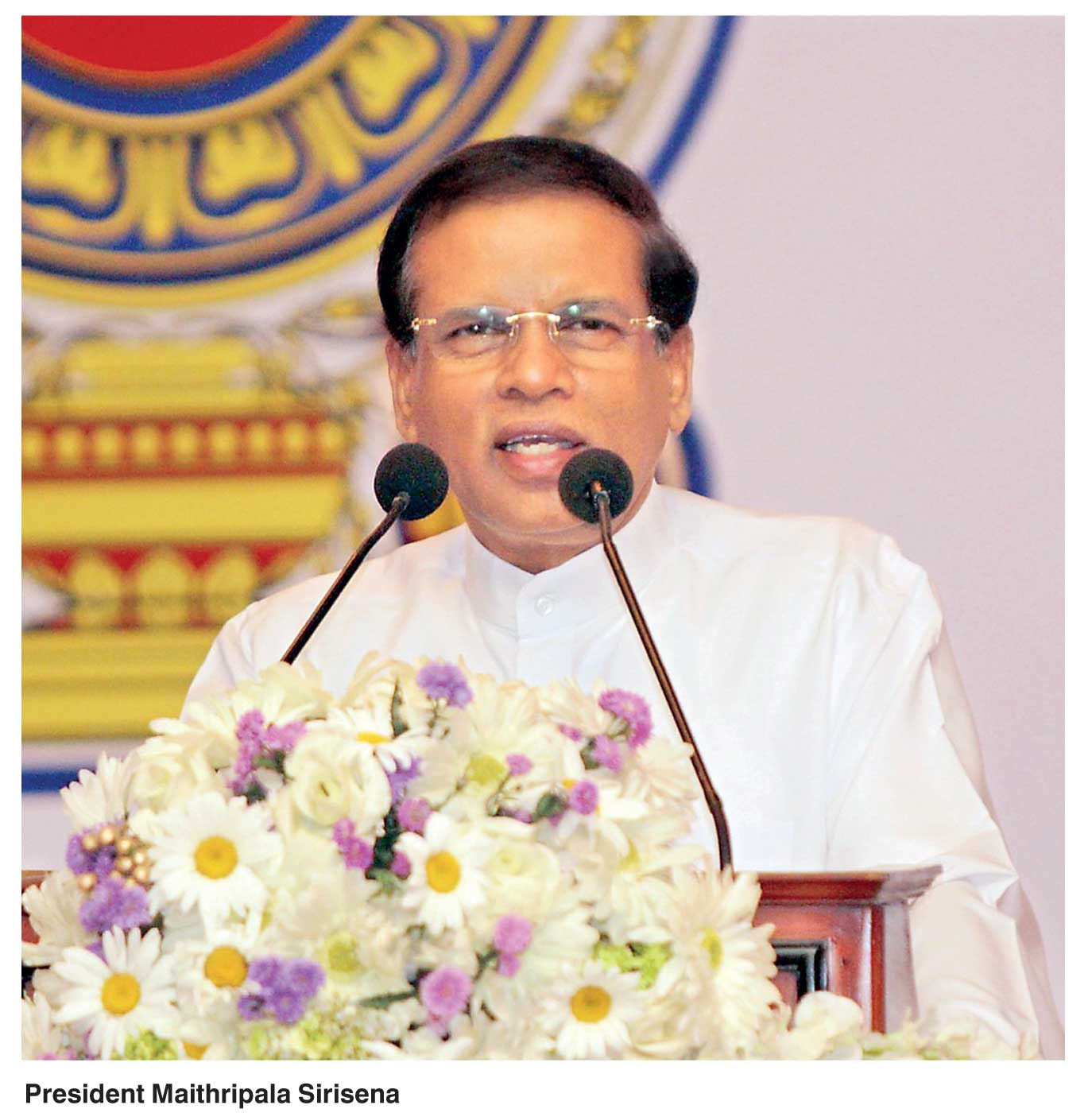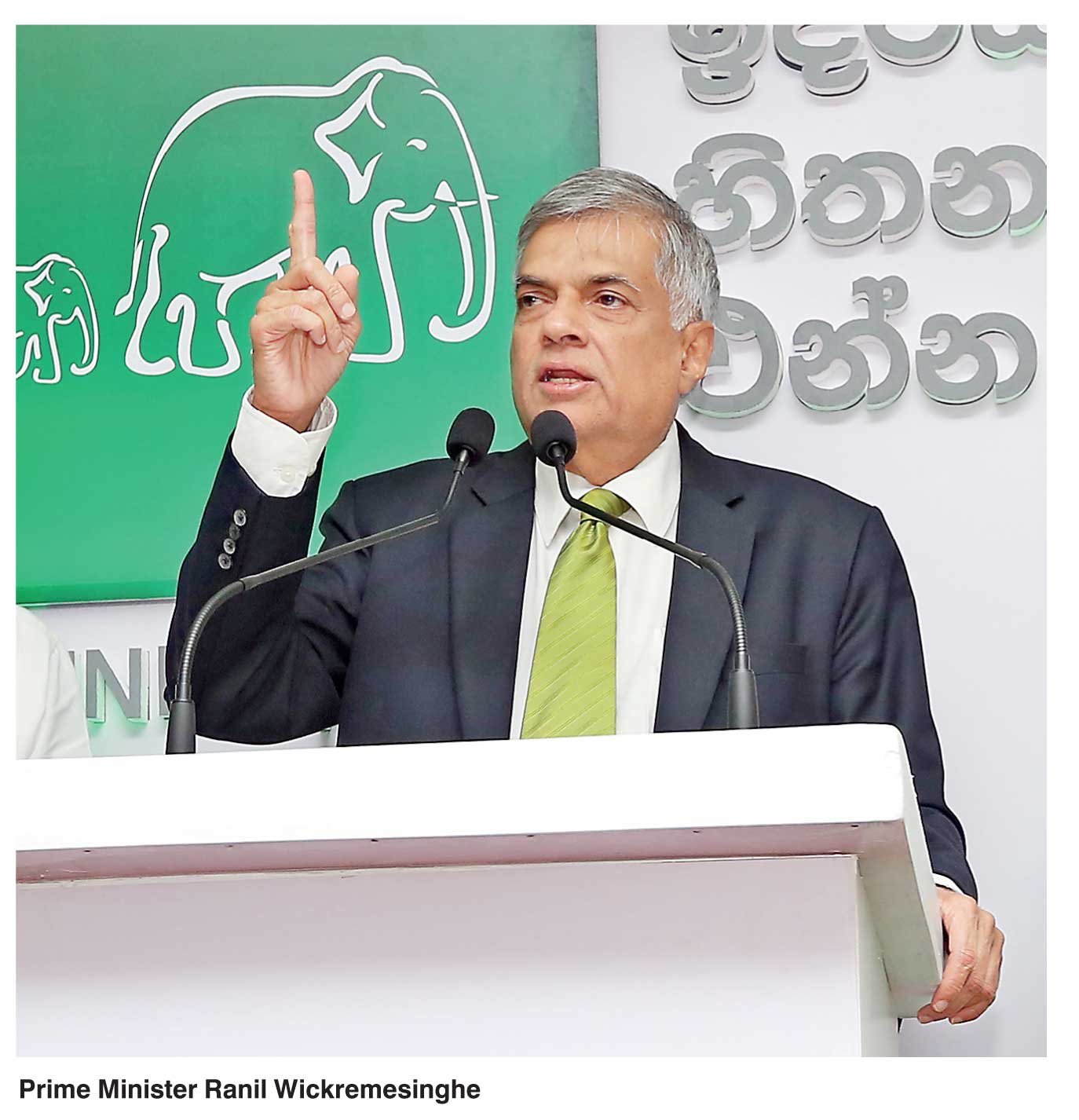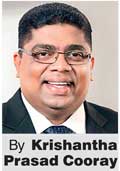Tuesday Feb 24, 2026
Tuesday Feb 24, 2026
Monday, 9 January 2017 00:55 - - {{hitsCtrl.values.hits}}
 Maithripala Sirisena, elected the sixth executive President of Sri Lanka on 8 January, was the victor over a highly popular and seemingly invincible opponent. Nevertheless, it was a victory of the people of Sri Lanka, as President Sirisena himself has often said. It became a people’s victory because the battle was between a political ideal and a personality.
Maithripala Sirisena, elected the sixth executive President of Sri Lanka on 8 January, was the victor over a highly popular and seemingly invincible opponent. Nevertheless, it was a victory of the people of Sri Lanka, as President Sirisena himself has often said. It became a people’s victory because the battle was between a political ideal and a personality.
Ranil Wickremesinghe, for example, had to sacrifice what in retrospect seems to have been a good chance to be president. He made way for a man who had a decidedly better chance of defeating Mahinda Rajapaksa, a strongman president with a cult following. Maithripala Sirisena had to take an enormous risk in coming forward. He, perhaps more than anyone else, knew the consequences of a possible defeat having seen the trials and tribulations that Sarath Fonseka had to suffer in 2010 after failing to dislodge incumbent Rajapaksa at the January 2010 presidential race. Dissident Sirisena took a risk that few in this world would have taken and deserves all the accolades that followed his victory.
Nevertheless, it was not his victory alone. Every single individual who openly supported the Sirisena candidacy was taking an enormous risk. The vindictiveness of the previous regime, after all, was not a secret. Prominent representatives of civil society, led of course by the late Ven Maduluwawe Sobitha Thero, leaders of political parties and other political organisations including trade unions, professional, academics and media personalities rose to the occasion. Most importantly, the crucial votes came from people who decided that ending decades-long terrorism did not give the incumbent a license for perpetual and corrupt rule. The anti-Rajapaksa bloc vote was also necessary to deliver the January 2015 outcome.
I remember that day very well. On election day, as I left home, my wife asked me the question that probably troubled many who voted for Maithripala Sirisena: ‘What if Mahinda Rajapaksa wins?’
I told her that he would be defeated but that he might not leave office in a hurry. It was a concern that was shared by many. It was a justified fear of people in our families due to what we had to suffer during the previous regime. There were many who were forced to leave the country. Even some Sri Lankan expatriates were scared to be seen in the company of ‘political refugees’ from home fearing a backlash from the Rajapaksa regime. The general attitude could be summed up this way: ‘If Mahinda doesn’t like you, please understand, we cannot be associated with you in any way’. It was not only high profile individuals like Sarath Fonseka and the former Chief Justice Shirani Bandaranayake, who invited the wrath of the Rajapaksas. There were many ways in which critics of the regime could be made to pay and indeed most of them were made to pay dearly for the choices they made.
First and foremost, then, the January 8th result made my wife’s question irrelevant. Importantly and happily President Maithripala Sirisena did not engage in the kind of witch-hunt that his opponent in all likelihood would have carried out had the outcome been different. It was clear from the outset that rule of law had another chance in this country.
It is now two years since that historic people’s victory. Anniversaries of significant political moments naturally call for retrospect. The time that has passed is often described in terms of progress made. The delivery of promises made or otherwise is assessed. Errors are enumerated. Recommendations for rectification are proposed along with blue-prints for the way forward.
What was Sri Lanka immediately before 8 January 2015? I believe it was a sick patient. I believe it was a patient plagued by multiple and near-fatal ailments. It was a patient battered, bruised and bleeding from multiple and life-threatening injuries. It was, however, a patient that was well dressed to hide the wounds and one that had a face so heavily and even artistically made up. The first impression was of a person in the pink of health. Pretence can hold up only for so long. The decaying body gives out foul odours. They break through all cosmetics. The truth was ready to emerge and emerge it did in the form of a telling electoral defeat for the Rajapaksa regime.
This is what the new government inherited. It was tasked to treat and revive a dying patient. Maithripala Sirisena and Ranil Wickremesinghe were charged with bringing back to health a patient who had been poisoned and thereafter treated by quack doctors who dealt with symptoms and not the disease, who used bandages to cover up wounds without treating them. Truth be told, even the physicians thus tasked learned of the true nature of the ailments only much later. Perhaps this is why, two years later, Maithripala Sirisena’s manifesto and the timeframe that the new dispensation set out for itself appears to have been over-ambitious.
Sri Lanka’s prognosis
It is in this context that one must assess performance. The problem of inaccurate assessment of a patient’s condition is that it leads to expectations that are unrealistic. For example, you cannot expect a fast bowler who has had knee-surgery to perform at full pace immediately after leaving hospital. Indeed he would need several weeks or months of therapy to get back to full fitness.
Sri Lanka’s case is far worse. As mentioned, the patient had multiple ailments, some of which were evident in part by symptoms and some which were hidden or at least not easily identified. It is as though the patient had high cholesterol, was a chronic diabetic, had several malignancies and had been kicked in his kidneys, had a couple of ribs broken and also been shot in the leg. Expecting the patient to walk out of hospital after a couple of pain-killers would be a tall order indeed. Expecting the patient to run a marathon is absolutely out of the question.
However, it has to be remembered that the conditions are not untreatable. Proper medication, proper therapy and proper care can do the job, in this, the Government can count some successes but also has to acknowledge failures. Some drugs don’t work on some patients and wrong prescriptions are not unheard of in the medical profession. However, we are not talking about the right leg being amputated when it is the left leg that needed to be removed. The mistakes that have been made are not irreversible.
It is no easy task to revive a collapsed economy, restore a failing democracy and bring about reconciliation and national unity. Each of these, even if they had to be dealt with separately, would have been tough. This Government has had to attend to all these simultaneously. Naturally there has been more progress in certain areas while successes on other fronts have been modest.
The best performance has been in the sphere of democratisation. The 19th Amendment, which curtailed the powers of the president, strikingly with the full support of the very man who enjoyed the near dictatorial powers, was a significant achievement. It also included the setting up of independent commissions on multiple subjects. The Right to Information Act, likewise, was a significant achievement. The true benefits of these measures will no doubt take some time to be fully appreciated. They seek to change the anti-democratic culture that has plagued this country, a condition which was ironically constitutionally enshrined.
Politicians as well as the general citizenry are yet to fully understand the potential of these changes. No doubt, in time, their reference and subsequent application and the inherent empowerment will be realised. Already we’ve seen how the space for criticism has expanded. Those taken to task by the media and by other sections of the polity are engaged with and not abducted. Due process in all matters is slowly but surely becoming a reality. If electoral reforms are instituted as per the promised 20th Amendment, democracy will well and truly be on the path to full recovery.
The economy is decidedly a more delicate matter. It has been unfortunately marked by indiscipline. Almost everything has been framed by the self-serving needs of those in high places of power. The politicisation of anything and everything didn’t make the country investor-friendly. Foreign relations being at an all-time low didn’t help either. To put it in a nutshell, the economy was on its last legs. In contrast to democratising reform, an economy cannot be turned around by edict.
 There are things that can be controlled and things that are out of the hands of the men and women in charge, in this case global factors. The medicine can be bitter and the surgery painful. There are no magic injections that will set things right overnight. Gains on one front often coincide with losses on another. It is inevitably a slow and painful process. Establishing fiscal discipline can cause a lot of discomfort. Rooting out corruption and cronyism is not an easy task either. Gains have been made but the destination is still quite a distance away.
There are things that can be controlled and things that are out of the hands of the men and women in charge, in this case global factors. The medicine can be bitter and the surgery painful. There are no magic injections that will set things right overnight. Gains on one front often coincide with losses on another. It is inevitably a slow and painful process. Establishing fiscal discipline can cause a lot of discomfort. Rooting out corruption and cronyism is not an easy task either. Gains have been made but the destination is still quite a distance away.
The same can be said of the reconciliation process. The most important difference has been in the area of trust. A space for dialogue has been created and with democratic reforms this can only grow. It has been established now that there are no winners in a conflict and that reconciliation is about building trust and building on trust to build partnerships. Unity never comes cheap. It is never a quick fix. It takes time to forge. The forging instruments are now in the hands of the people.
Yes, the people. They made this change possible. If the government is considered to be a team of physicians, then all the institutions and all the people including members of the government in their personal capacities must be considered the patient that we referred to above. The body must also fight and be a partner in the process of healing. A patient that is in the dark about the ailments is not an ally but in fact can rebel against the process of recovery and even be an enemy to himself or herself.
Communication challenge
This, I believe, is the biggest failure of the Government. The true nature of the tasks at hand has not been communicated to the people. The people still expect quick fixes to the plethora of ailments. They want to be up and running, not realising that the track is not yet ready and the preparation is still in its initial stage which, as always, is slow and involves a lot of hard work, patience and understanding.
 Of course it is easier to market cosmetics as opposed to ill-health. Bad news does not make anyone happy. However, the truth has to be communicated and communicated effectively. This is something this Government has failed to do. Ironically, it is almost as if the Government is scared to tell the truth to the very people that brought it to power.
Of course it is easier to market cosmetics as opposed to ill-health. Bad news does not make anyone happy. However, the truth has to be communicated and communicated effectively. This is something this Government has failed to do. Ironically, it is almost as if the Government is scared to tell the truth to the very people that brought it to power.
This country will not be ready for economic take-off over the next few days. People will not be waking up tomorrow to find peace and prosperity at their doorsteps. The government has to revisit the period preceding January 2015 and remember that the electoral victory was possible because the people believed there could be change. That belief was reconfirmed in August 2015. Mahinda Rajapaksa’s sway over the media did not stop the people from thinking independently, being critical and acting out on their perceptions.
Even as the government moves on democratisation, economic rebuilding and reconciliation, it has to work as hard on communicating the hard truths relevant to all these processes. The government has to believe that the people can still believe in the Government.
The marathon can be run, this is certain. After two years, only light jogging is possible. Given all the obstacles that this Government inherited and given the incompetency it is saddled in part due to a long standing human resource crisis in the country we will not see things in full stride in the short term. It is reasonable to predict that things will be clearer and better by the year 2020, but for this to happen, important steps have to be taken right now, that is in the year 2017, to correct the correctible errors, get things back on track and above all to be brutally honest about everything to the people. This is because it was a people’s victory that we saw in January 2015. The people deserve to know the truth and in fact progress is clearly possible only if the people know the truth and decide to support progressive efforts simply because they feel empowered by the fact that they have been taken into confidence.
January 2015 was a people’s victory. Sustaining the gains clearly depends on whether or not the people remain with the government. They will be if they believe they are still partners of the forces that they brought to power. Making them continue to believe is the challenge. It is a challenge that has two distinct components: getting the job done and keeping the people informed of all aspects of the process at all times.